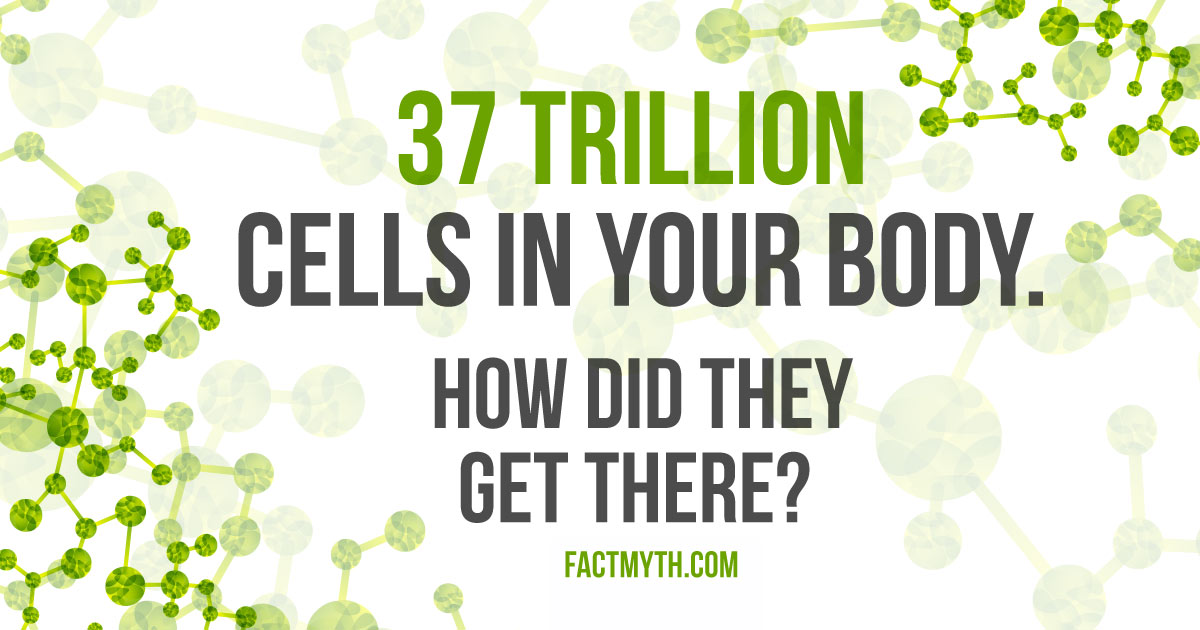We have many different types of cells in our bodies, but they all originated from one cell, the fertilized egg cell courtesy of your parents.
Humans Have Many Different Types of Cells fact

How Many Cells Does a Human Body Have?
The human body has about 37 trillion cells, comprising 200 different types. Each cell has structures responsible for making 100,000’s of different proteins from 20 types of amino acids. Despite this, the code to produce all of these cells and much more is stored in the DNA of (almost) every cell, and all cells come from the same cell.
Each of the 200 different types of cells has a unique function, but most produce proteins that perform many of a given person’s bodily functions.
A video discussing cell division and why humans have so many cells.- Humans have about 37.2 trillion cells.[1]
- There are 200 different types of cells. Within these cells, there are about 20 different types of structures or organelles (organs within a cell). Each organelle performs a different function.[1]
- During a human’s lifetime, many cells will replace themselves every 7 – 15 years, but not all cells do this. Some replace themselves every few days or weeks; others never replace themselves.
TIP: See a List of distinct cell types in the adult human body for more information on cell types and functions.
Is 37 Trillion an Exact Count?
Counting the number of cells in a human body is hard. Guessing based on volume gives you an estimate of 15 trillion cells; if you calculate by weight, you end up with 70 trillion. This is because each cell has a different density.[2]
Given the above problem, a 2014 study broke down the cells by each type and did a count that way. They got 3.72 × 1013 or as we say in everyday terms 37.2 trillion (or even more simply about 37 trillion).[3] We are still debating and examining this number.
Where Did The first Cells Originate?
All the cells in a humans body come from one cell, the fertilized egg cell composed of a mother’s egg fertilized by a father’s sperm. That cell contains all the DNA needed to make a human being unique or make an identical twin.
The original cell divides over and over again. Each new cells contain the same DNA but express it different genes.
How Can Each Cell Have the Same DNA?
Almost every cell, with a few exceptions, has the same DNA. Inside that DNA is over 20,000 human genes, which get expressed as the cells divide and grow due to asymmetric cell division. At least one of two daughter cells are different from the parent. Cellular differentiation can also occur, which means one cell becomes another cell without dividing.[1]
What Makes Each Cell Different?
When a cell divides, or “evolves,” it has a chance of expressing different sets of genes encoded in it’s DNA. When different sets of genes develop, the type of cell changes as does the type of proteins created.

An image showing different organelles of a cell and different cell types.
Where Does The First Cell Come From?
We know that you started with an egg, sperm, and a little chemistry, but where did the first cell come from? We can’t answer that question, but we are reasonably sure how complex cells evolved. We think they came from two single cells which formed together in a symbiotic relationship and shared DNA with each other to survive, thrive, and develop into the cells that made you today. What is the origin of the first single cell? We don’t know. Chemistry, outer space, or even perhaps something more spiritual may hold the answer.
- “The Cells in Your Body” Sciencenetlinks.com
- “There are 37.2 Trillion Cells in Your Body” Smithsonianmag.com2015.
- “An estimation of the number of cells in the human body” Tandfonline.com
- “How Do Genes Work?” genetics.Thetech.org
- “DNA, RNA and protein – the Central Dogma” Science-explained.com
- “From DNA to Protein” UIC.edu
- “Asymmetric cell division” Wikipedia.org
- “Cellular differentiation” Wikipedia.org

SATAN Doesn't beleive this myth.
they have one
Thomas DeMicheleThe Author Did not vote.
All cells start as one cell to become the many different types of cells.